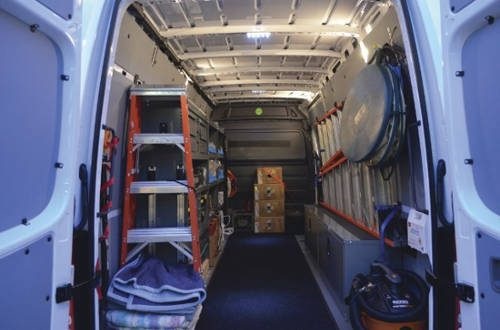
7.29.22 – CEPro
Integrators need ‘non-owned auto liability insurance’ to protect against being sued for accidents in rented vehicles or employees’ cars.
Having the proper insurance coverage in place for your custom installation company can be a slippery slope. And there is one common circumstance that can fall through the cracks if dealers are not careful: non-owned auto liability insurance.
This comes into play in several common situations:
- When employees are allowed to use their own personal vehicles for work
- When you rent a larger vehicle necessary for transporting certain bulky gear to a job site that won’t fit in one of your regular fleet
In both cases, integrators might believe they are fully protected by their general liability insurance for their business; however, unless non-owned auto liability is specifically packaged into your general liability insurance (under the same policy number), you might not be covered, and thus open to being sued, according to Shawn Iverson of the Alarm Insurance Center.
Iverson spelled it out in a thread in Ken Kirschenbaum of Kirschenbaum & Kirschenbaum’s Alarm Exchange newsletter. Kirschenbaum is a legal expert and columnist for CE Pro’s sister publication Security Sales & Integration. Iverson explains:
- If employees get into an accident while using their own or a rented vehicle
for business purposes non-owned auto liability policies transfer the risks to your insurer. However, it’s important to remember that this coverage protects your business and not the employee driving the vehicle. - If your employees get into an accident and you are sued, legal costs can add up
quickly. Non-owned auto liability policies help organizations cover legal expenses following a claim. - Protection that accounts for employees of all statuses; hired and non-owned auto liability policies can provide coverage for all of your staff, regardless if they are full-time, part-time, or temporary employees. This is particularly useful for organizations that hire additional staff during busy periods
- Coverage beyond basic policies; If your organization allows employees to use personal vehicles for work, chances are your general liability and auto policies offer insufficient protection. Non-owned auto insurance offers unique coverage often excluded in standard policies, ensuring your organization is insured for accident
According to Jeff Schulz, managing director of the commercial division for insurance company J Krug and Associates, every company likely has a Hired/Non-Owned Auto Liability exposure built into their Commercial Auto Policy.
“If you don’t own any vehicles through the company a lot of times this coverage will be an add-on or via endorsement onto your Commercial General Liability/E&O (Errors & Omissions) Policy. The endorsement is relatively inexpensive to include this coverage, especially since almost every company has employees driving at some point in the course of employment,” he notes.
Is Commuting Considered Being ‘At Work’?
Kirschenbaum clarifies that an employee who is commuting to and from work in his or her personal vehicle is not by definition at work. So if they get into an accident on their way to and from work, the employer is not liable.
However, if the employee stops on their way to and from work to home to take care of a work-related matter, then the dealer could be liable.
“If the employee is permitted to leave the workplace for lunch or on a break, the employee is not working. But if the employee leaves for lunch and does a business-related chore, you can be liable because the employee is working,” explains Kirschenbaum.
“You need non-owned automobile insurance whether the employee is driving a vehicle owned by the employee, leased or rented by the employee, owned by someone other than the employee or leased or rented by someone other than the employee. The point is if the employee is driving a vehicle for work-related purposes you can be held liable as the employer,” he adds.
“We all carry insurance we hope we won’t ever need, from health, disability, death, dental, homeowners, auto, business liability, and lots more I don’t even want to think about.
“The moment you wake up and roll out of bed your potential liability starts, and for those with employees, your time is all the time, even while you’re sleeping. You have to decide the risk you want to take, but auto accidents are fairly common, and too many employees don’t carry enough insurance to satisfy most accident claims,” summarizes Kirschenbaum.
